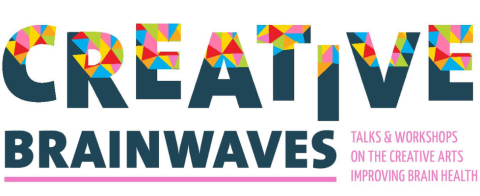Programme: Dún Laoghaire Rathdown
WHO Theme: Community Support and Health Services
Cost: 10000+
Status: Ongoing
Description
Creative Brainwaves builds on a previous project Framing the Senses and is informed by the needs of local artists, activity co-ordinators, carers, and by research and best practice. The programme contains four strands of activity, with four distinct areas of focus.
A workshop facilitated by Professor Ian Robertson for 10 artists experienced in working with people with dementia, alongside a sharing day for 40 healthcare professionals and artists interested in dementia inclusive arts practice.
A series of 5 Creative Dementia Inclusive Awareness Raising public workshops and talks in partnership with the Global Brain Health Institute (GBHI), co-ordinated by Karen Meenan from the GBHI and including leading neuroscientists, researchers and creative artists who specialise in this area. A total of 364 people attended these talks in dlr LexIcon, Dún Laoghaire.
A series of one-to-one creativity and arts sessions with 4 people living with dementia and carers together in their homes, supported by the Alzheimer Society of Ireland and led by the Living Well with Dementia programme.
Six multisensory arts-based workshops led by artists Claire Halpin and Orla Goodwin for people living with dementia in two residential care settings (Dalkey Community Unit and St. Joseph’s Shankill), with 9 in attendance per session.
Aim of Initiative
Creative Brainwaves is a programme that aims to increase awareness of the positive impacts of engagement with the creative arts and the benefits of fostering creativity in older people living with dementia. It also aims to build capacity and sustain the creative practice that has evolved locally by supporting artists/facilitators.
Who is it aimed at
The 4 strands of Creative Brainwaves provide a variety of creative and social supports and information to older people living with dementia, their families and friends, healthcare staff and the general public.
3 Steps critical to success
- Networking – Working with existing partners such as Living Well with Dementia and the creative practitioners while forging new relationships and collaborations with Global Brain Health Institute. On-going work through the dlr Age-Friendly Alliance and our dlr Age-Friendly Programme partners enabled the programme to be shared widely and encouraged strong buy-in as good collaborative working relationships already established.
- Engagement – Having complete buy-in and engagement from the staff, management, service users and their families in the relevant care settings, Dalkey Community Unit and St Joseph’s, Shankill. Previous work programmes including Cuirt & Cultúr and the Bealtaine festival had developed interest in the role of creativity as we age. The annual Age Friendly magazine 2024 produced by Dún Laoghaire Rathdown County Council had brain health as its theme – this has enabled us to further raise awareness of the programme and encourage our community to pay attention to their brain health.
- Funding – The programme would not have been possible without funding received from the Creative Ireland Programme Creativity in Older Age strand.
3 Challenges in Planning / Delivery
- Finding the right facilitators for the talks and workshop sessions can be challenging. This is specialist work and so facilitators can be in high demand. Partnering with GBHI was critical to the success of the programme.
- The high take up for the talks exceeded expectations and we were fortunate to be able to accommodate all, there also was the expectation perhaps of more talks and this level of interest can be hard to sustain.
- Managing any four-strand programme is challenging. Previous collaborative work with established partners helped to manage the workloads equitably.
3 Outcomes / Benefits
- Outcome 1 – Awareness Raising.The range of programmes that this funding supported has increased awareness and has enhanced practice in the area. The overwhelming feedback from Creative Brainwaves is that people need and want more information about the impacts and benefits of creativity for people living with dementia. People were also encouraged that a dementia diagnosis need not be as frightening as it often is. There are steps family and friends can take to support and add quality to life for those experiencing dementia and their support network.
- Due to the level of interest in and feedback from the GBHI talks held in October/November 2023, a series of 3 further talks took place in May 2024 as part of the dlr Festival of Inclusion/Bealtaine Festival, which were well attended. We have also produced podcasts of the talks which allow them to have a longer shelf life.
- Grant funding for projects supporting Health and Well-being through Creativity have been green-lit for 2024 and 2025 under the national Creative Ireland Programme. This will see a new programme Let’s Get Social dlr! come to fruition over a two-year period which aims to deliver:62 Creative Cafes taking place in partnership with Southside Partnership’s dlr Social Prescribing team, 9 Creative Brainwaves public talks, capacity Building in the Arts and Health sector with 3 bespoke workshops for 10 creatives, 1 workshop for 10 healthcare professionals, and 4 pilot projects that will engage creatives, healthcare professionals and our older community, including those living with dementia, and the development of 2 performing arts clubs taking part in 20 workshops with 2 highly skilled arts professionals.
Let’s Get Social dlr will:
support participants to adopt healthy lifestyles and behaviours; enable positive ageing across dlr; contribute to a reported improvement in participant’s mental and physical well-being through arts and culture; increase the number of experienced creatives/artists who work in healthcare and community contexts; enable greater knowledge within the healthcare sector and wider public about the positive impacts of creativity for our ageing population.

